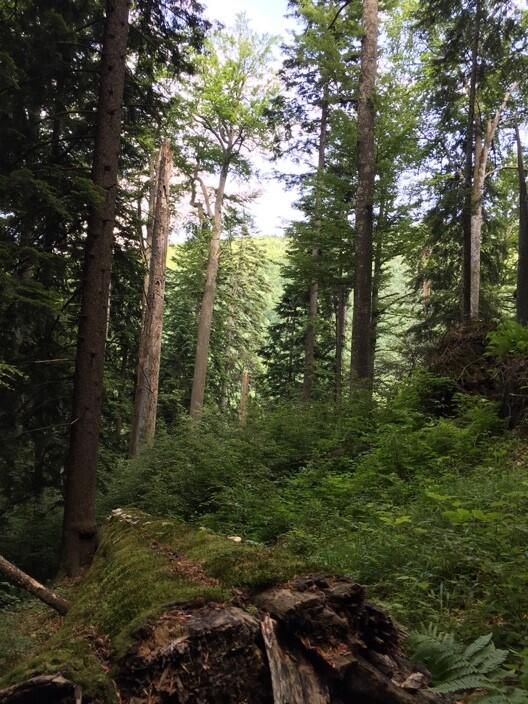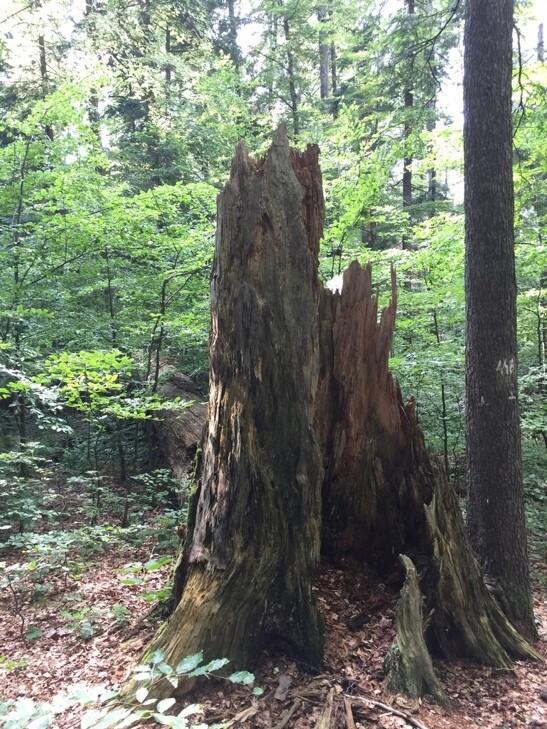Primeval Forests in (Central) Europe – Taking Responsibility for the European Natural Heritage (Primeval Forest Responsibility)
International project funding
Subject and goals of the project
In the project, the Rottenburg University of Applied Forest Sciences, in cooperation with other partners from the fields of science and civil society, focuses on measures to protect the last large-scale European primeval forests in Romania (Carpathians). The main focus is on the identification and documentation of Romanian primeval forests in the Carpathian region as well as capacity building and tourism value creation. Thus, an important contribution to the protection of this European natural heritage is to be made. The project is to provide exemplary impulses for the protection of primeval forests and best practice recommendations for the necessary commitment of other actors.
The last large-scale Central European primeval forests in the Carpathians play a central role as a closed landscape area for European forest nature conservation and for the protection of source populations of large carnivores. Initiatives that integrate wilderness areas on a regional level into regional value creation concepts, for example in the field of sustainable tourism, allow an alternative value creation to the forestry use of these ancient and primeval forests. Support for Romanian actors in the implementation and promotion of sustainable projects, which do not endanger the unique ecological qualities, will also be provided by the project.
The following measures are intended to achieve the project goals:
- Identification and mapping of ecologically and scientifically particularly important primeval forest areas as proposals for inclusion in a National Catalog of Primeval Forests and Quasi Primeval Forests for Romania. An area of up to 2,000 hectares of previously insufficiently documented primeval forests is to be identified, mapped, inventoried and reported.
- Organization and implementation of methodological workshops (capacity building) for mapping and monitoring of (primeval) forest refuges. The aim is to provide Romanian scientists with the methodological know-how to independently carry out mapping and studies for virgin forest areas beyond the project period. At least ten scientists should also be familiarized with technical know-how for the identification and monitoring of illegal encroachments in protected areas. In Romania, there is a lack of basic knowledge in particular, but also of the prerequisites for using modern equipment (including digital measuring devices and drones) and for evaluating data sources such as satellite data and relating them to field data.
- Identify regional value-added options for communities/rural regions based on virgin forests. Concrete examples are needed that integrate wilderness areas into regional value creation concepts on a regional level. It is not sufficient if impressive forests are only accessible to a few specialists. Accordingly, Romanian actors should be provided with assistance for the implementation of sustainable tourism concepts. In two valley communities, new value creation models will be identified together with local actors and best practice approaches will be developed in at least one of the valley communities.
- Transfer and public relations will be promoted by conducting analog and digital workshops to build capacities. Experiences from German and Austrian wilderness areas will be taken into account through cooperation with local experts. Project results will be continuously made available to professional media and published scientifically.
Innovation and exemplary nature of the project
The content of the project focuses on an issue of outstanding importance at the European level, since the largest part of the last European primeval forests is located in the Carpathian region. The measures are suitable to achieve significant impact in the field of protection of ancient and primeval forests in the Romanian Carpathians. The project focuses on training contents that have not yet been sufficiently taken into account in Romania (especially in the fields of mapping, monitoring, remote sensing). Also, new legal framework conditions on national level as well as EU-legal aspects will be communicated. With regard to regional value creation options for communities/rural regions based on the primeval forests to be protected, new concepts are to be developed together with valley communities and priority measures for the promotion of tourism capacity are to be identified. Local/regional actors/stakeholders will be actively involved in the implementation of practical workshops, which will also include the implementation of concrete practical tests with local actors in order to make alternative use perspectives of the forest tangible. In workshops and expert discussions, space is thus given to the topics of value creation/regional development and experiences from German and Austrian wilderness areas are actively integrated. With this project and a DBU-funded predecessor project (AZ 34044), a total of more than 7,000 ha of old-growth and primeval forests can be investigated and their registration in the National Catalogue of Primeval Forests and Quasi Primeval Forests in Romania can be realized.
Special aspects of the project
The overall project shows how measures for the inventory of old-growth and virgin forests can lead to the transfer of forest ecosystems to a protected status and to new forms of sustainable value creation. In this way, the acceptance of measures for the protection of forest ecosystems can be promoted in society, but also in politics and administration in Romania. At the same time, the project provides a model that could be adapted in other CEE countries.
Funding subject: Nature conservation and sustainable use of nature in cultural landscapes and protected areas
Cooperation partners:
- Rottenburg University of Applied Forest Sciences, Rottenburg, Baden-Wuerttemberg
- Carpathia Foundation, Brasov, Romania
Locations: Baden-Wuerttemberg and Romania
Funding period: October 2021 to April 2024
Project costs: Total volume: 149 540 Euro, DBU funding: 124 540 Euro
DBU-AZ: 37524
Note: Translation of the German version with DeepL
Last updated: 20.05.2022



